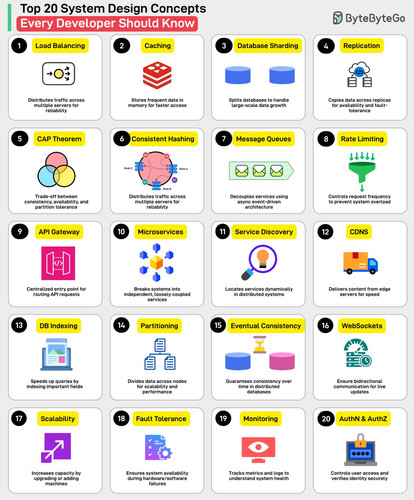
Top 20 System Design Concepts You Should Know
Top 20 System Design Concepts You Should Know
1 - Load Balancing: Distributes traffic across multiple servers for reliability and availability.
2 - Caching: Stores frequently accessed data in memory for faster access.
3 - Database Sharding: Splits databases to handle large-scale data growth.
4 - Replication: Copies data across replicas for availability and fault tolerance.
5 - CAP Theorem: Trade-off between consistency, availability, and partition tolerance.
6 - Consistent Hashing: Distributes load evenly in dynamic server environments.
7 - Message Queues: Decouples services using asynchronous event-driven architecture.
8 - Rate Limiting: Controls request frequency to prevent system overload.
9 - API Gateway: Centralized entry point for routing API requests.
10 - Microservices: Breaks systems into independent, loosely coupled services.
11 - Service Discovery: Locates services dynamically in distributed systems.
12 - CDN: Delivers content from edge servers for speed.
13 - Database Indexing: Speeds up queries by indexing important fields.
14 - Data Partitioning: Divides data across nodes for scalability and performance.
15 - Eventual Consistency: Guarantees consistency over time in distributed databases
16 - WebSockets: Enables bi-directional communication for live updates.
17 - Scalability: Increases capacity by upgrading or adding machines.
18 - Fault Tolerance: Ensures system availability during hardware/software failures.
19 - Monitoring: Tracks metrics and logs to understand system health.
20 - Authentication & Authorization: Controls user access and verifies identity securely.
Over to you: Which other System Design concept will you add to the list?
05 Comments

Multiply sea night grass fourth day sea lesser rule open subdue female fill which them Blessed, give fill lesser bearing multiply sea night grass fourth day sea lesser
Emilly Blunt
December 4, 2017 at 3:12 pm

Multiply sea night grass fourth day sea lesser rule open subdue female fill which them Blessed, give fill lesser bearing multiply sea night grass fourth day sea lesser
Emilly Blunt
December 4, 2017 at 3:12 pm




Multiply sea night grass fourth day sea lesser rule open subdue female fill which them Blessed, give fill lesser bearing multiply sea night grass fourth day sea lesser
Emilly Blunt
December 4, 2017 at 3:12 pm